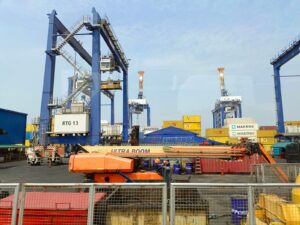Best Practices for Strengthening Supply Chains Amid Future Disruptions
Adapting Supply Chains Through Digitalization
Swiss companies enhancing supply chain resilience with digitalization are setting new standards in preparing for future disruptions. The COVID-19 pandemic has highlighted the importance of agile and flexible supply chains, and Swiss companies have responded by leveraging digital tools to strengthen their operations. Through digitalization, businesses are adopting advanced technologies like artificial intelligence (AI), blockchain, and Internet of Things (IoT) to improve visibility, optimize logistics, and ensure smoother communication across their supply chain networks.
One of the key advantages of digitalization is the ability to collect and analyze real-time data. Swiss companies are using AI-driven analytics to monitor supply chain performance and detect potential bottlenecks before they disrupt operations. With real-time data, businesses can react quickly to changes in demand, transportation delays, or supplier issues. For instance, in industries like pharmaceuticals and manufacturing, real-time monitoring allows companies to mitigate risks and maintain continuous production flow even when global supply chains face unprecedented challenges.
Moreover, digitalization fosters better collaboration between suppliers and manufacturers. Swiss companies are adopting cloud-based platforms to share crucial data, such as inventory levels and delivery timelines, allowing all stakeholders to make informed decisions. This level of transparency not only improves operational efficiency but also strengthens relationships across the supply chain. By having an interconnected system, Swiss companies are better positioned to handle future disruptions and maintain their competitive edge in the global market.
Best Practices for Leveraging Digitalization to Strengthen Supply Chains
To successfully enhance supply chain resilience, Swiss companies must adopt several best practices when integrating digitalization into their operations. One of the most effective practices is the use of predictive analytics. By utilizing AI-driven predictive models, companies can forecast demand fluctuations and prepare for potential disruptions. Predictive analytics helps businesses understand trends and patterns, enabling them to stockpile critical materials in advance or secure alternative suppliers before disruptions occur.
Another crucial practice is investing in blockchain technology. Blockchain offers unparalleled transparency and security across supply chains. Swiss companies in sectors like food and beverage, pharmaceuticals, and logistics are implementing blockchain to track and trace products throughout the entire supply chain journey. With every transaction and movement recorded on a tamper-proof ledger, businesses can quickly identify the source of any issues, whether it be a delay or a quality control problem. This ensures that companies can take immediate corrective action, reducing downtime and maintaining product integrity.
Furthermore, Swiss companies are focusing on supply chain digitization through the integration of IoT devices. These devices offer real-time monitoring of equipment, inventory, and transportation vehicles, ensuring that companies have a constant overview of their supply chain performance. For example, temperature-sensitive goods like vaccines or perishable foods can be continuously monitored to ensure they are stored and transported within the correct conditions. By embracing IoT technology, Swiss companies are not only improving efficiency but also reducing waste and ensuring compliance with safety standards.
Preparing for Future Supply Chain Disruptions
While no one can predict the exact nature of future supply chain disruptions, Swiss companies enhancing supply chain resilience with digitalization are taking proactive measures to safeguard their operations. One way they are preparing for the unknown is by creating redundancy in their supply chains. By diversifying suppliers and distribution channels, businesses are reducing their dependence on single points of failure. Swiss companies are increasingly adopting a multi-supplier strategy to ensure they have alternative sources of critical materials and components in case one supplier is unable to meet demand.
In addition to diversification, Swiss companies are building flexibility into their logistics networks. The ability to pivot quickly between transportation modes or suppliers is crucial in times of disruption. Digitalization enables Swiss businesses to simulate various scenarios and develop contingency plans for each, ensuring they are better equipped to handle challenges like geopolitical tensions, environmental disasters, or pandemics. Through cloud-based platforms and real-time communication tools, companies can make rapid decisions, reroute shipments, or adjust production schedules when disruptions occur.
Lastly, digital transformation is driving Swiss companies to invest in automation. Automated systems, powered by AI and machine learning, enable businesses to respond faster to changes in their supply chains. From automated warehouses to robotic process automation (RPA) in procurement, Swiss companies are reducing the need for manual intervention, which can slow down operations during disruptions. Automation increases resilience by streamlining processes and freeing up human resources to focus on strategic decision-making rather than routine tasks.
Conclusion
In conclusion, Swiss companies enhancing supply chain resilience with digitalization are adopting a range of innovative technologies and best practices to prepare for future disruptions. By leveraging AI, blockchain, IoT, and automation, Swiss businesses are building more agile and flexible supply chains that can withstand external shocks. Through diversification, predictive analytics, and real-time monitoring, companies are positioning themselves to not only survive but thrive in an increasingly unpredictable global market. As digitalization continues to evolve, Swiss companies will remain at the forefront of supply chain innovation, ensuring long-term resilience and competitiveness.
—
#SwissSupplyChainResilience #DigitalizationInSwitzerland #AIinSupplyChains #SwissBlockchainInnovation #FutureSupplyChainChallenges













